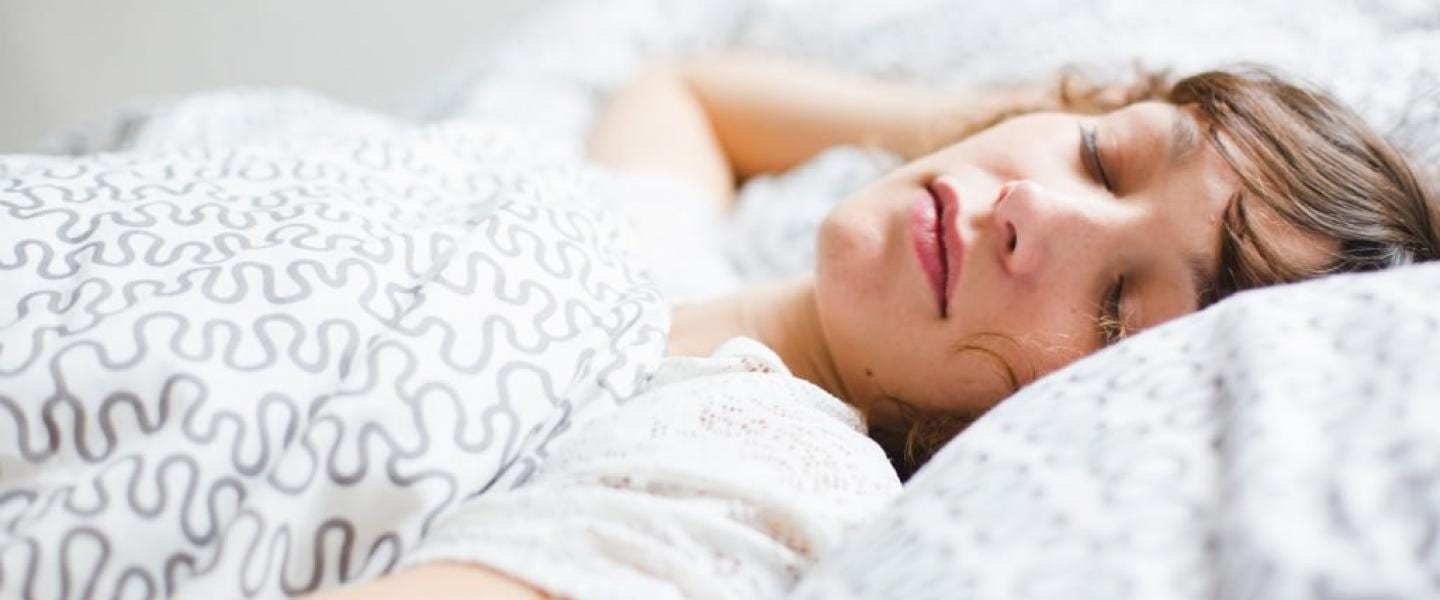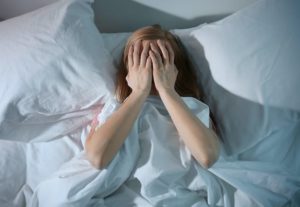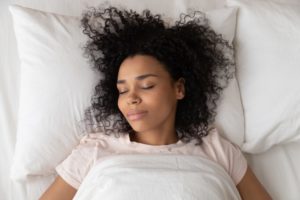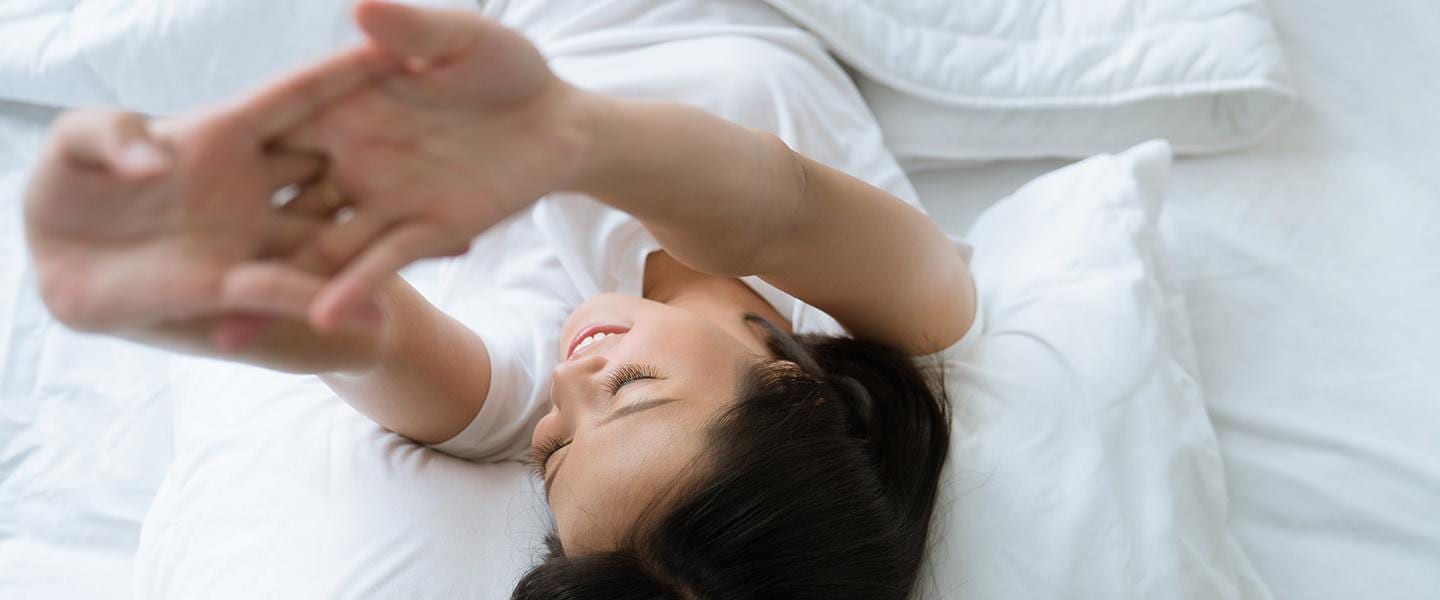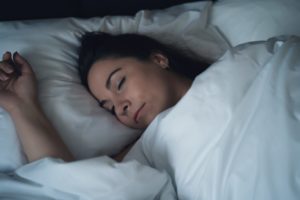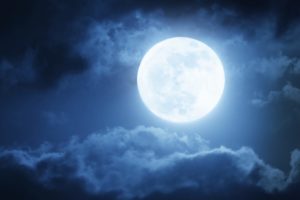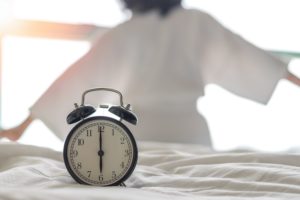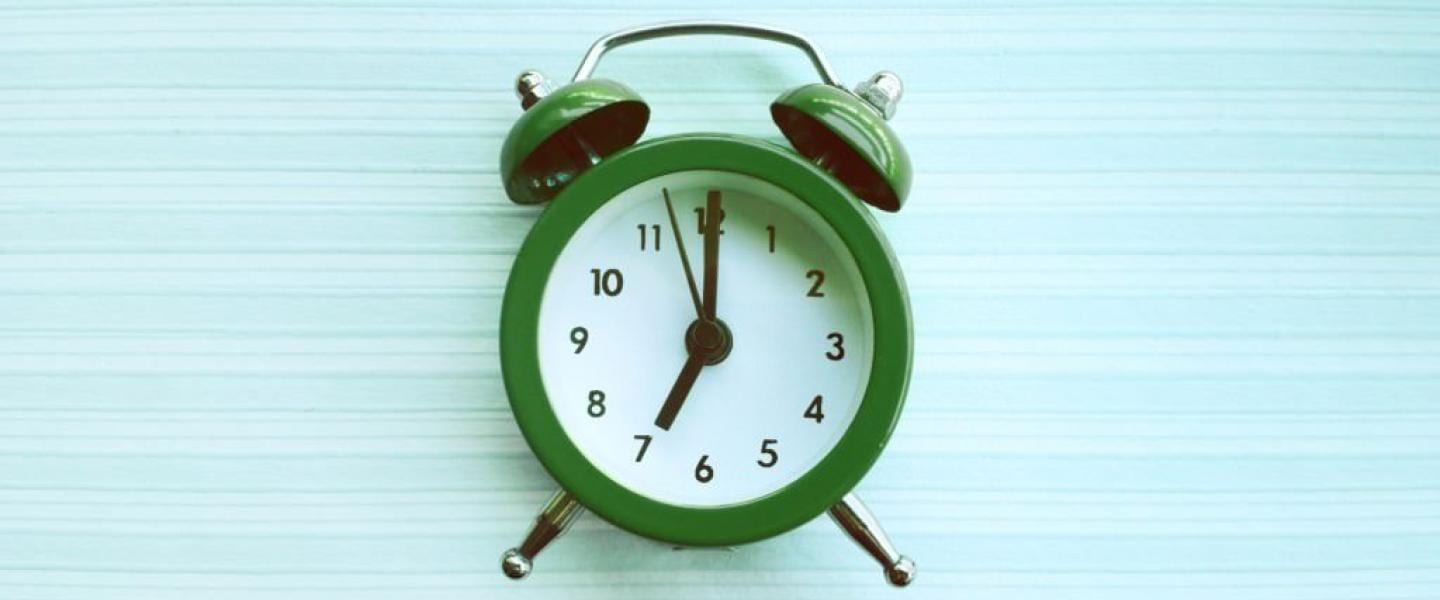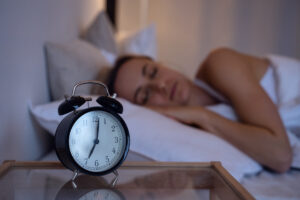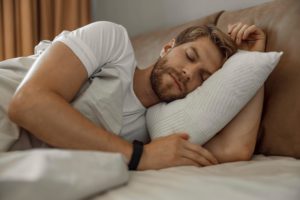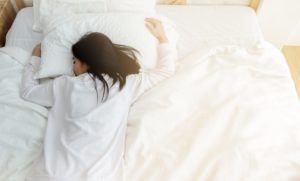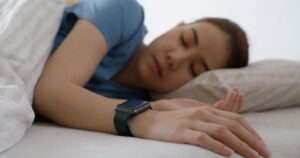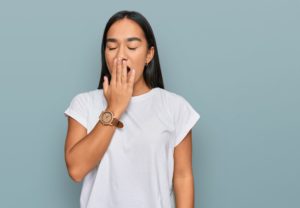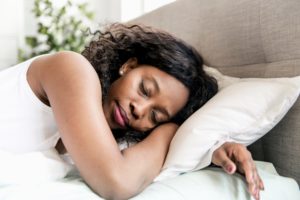Sleep Satisfaction and Energy Levels
Sleep is just as critical to our body as other basic functions of survival like eating, drinking, and breathing. Sleep is needed for energy conservation, restoration of our tissues and cognitive function, emotion regulation, and immune health.
Many of the restorative functions of sleep are specifically associated with non-REM sleep, which is the stage of deep sleep that leaves us feeling refreshed and alert. The body has multiple systems regulating our sleep-wake cycle and our journey through the cycle of sleep stages. These processes work together to ensure we get deep, restful sleep, and have energy throughout the day.
How Does Sleep Give You Energy?
One of the prominent theories on sleep function posits that sleep serves to conserve and restore energy. Since the introduction of this theory, research has explored the roles of two chemicals in particular – glycogen and adenosine . Glycogen is involved in storing energy in the brain, and glycogen levels have been shown to decrease during wakefulness. Sleep deprivation is also linked to decreased glycogen levels , and glycogen levels are restored during sleep. Adenosine, on the other hand, accumulates during waking hours and promotes sleepiness. It is proposed that glycogen reduction, while we are awake, leads to a build-up of adenosine , which in turn helps us sleep and restore lost glycogen. This type of feedback loop involving chemicals that regulate the sleep-wake cycle is known as sleep homeostasis.
It is likely there are many complex systems at play, but the investigation of glycogen and adenosine have inspired directions in research on sleep’s role in restoring energy.
Sleep satisfaction, which refers to one’s subjective perception of their quality of sleep, can also impact energy levels. One study found that poorer subjective sleep quality predicted next-day fatigue in individuals with chronic fatigue syndrome.
How Does Sleep Impact Energy Levels?
The relationship between lifestyle choices and sleep also impacts our energy balance . Energy balance is used to describe the net outcome of energy intake (food consumption) with energy expenditure (activity).
For example, a lack of nutrients like calcium, magnesium, and Vitamin D may negatively affect sleep duration. In contrast, healthy behaviors like physical exercise contribute to better sleep quality and increased energy.
Insufficient sleep has been linked to an imbalanced increase in energy intake over expenditure, which leads to a positive energy balance and weight gain. Sleep quality may also moderate the relationship between physical activity and feelings of fatigue . This indicates that diet, exercise, and sleep all interact and influence our feelings of energy and our energy balance.
Why Do I Have More Energy at Night?
Some people experience higher energy levels at night, making it difficult to fall asleep and get the rest they need. This can be especially troubling if demands like work or school still require them to wake early, and therefore get insufficient sleep.
Delayed Sleep-Wake Phase Disorder , which is a disruption in circadian rhythm, may be the cause. Circadian rhythms are 24-hour cycles controlled by certain genes called circadian clock genes. They help us align our sleep-wake cycle with environmental factors, like the natural 24-hour cycle of light and dark that coincides with day and night.
Circadian rhythms work together with the chemicals in our body that control sleep homeostasis and keep us on a regular schedule. However, circadian rhythms are still vulnerable to disruption from unhealthy lifestyle habits, underlying medical conditions, or even genetic predispositions. A circadian rhythm that has fallen out of sync with the cycle of day and night can lead to sleep deprivation, energy imbalances, and metabolic disease . Circadian disruptions have also been linked to cardiovascular diseases, sleep disorders, and cancer .
Diabetes risk is of particular concern for those who suffer from circadian disorders. This is because circadian rhythms regulate glucose levels, and misaligned rhythms result in increases in glucose and impaired glucose metabolism, which are risk factors for diabetes and obesity. Reduced sleep quality caused by circadian disorders can also influence unhealthy exercise and eating patterns , which exacerbate diabetes risk.

How Can I Get More Energy Without Sleep?
There is no replacement for a good night’s rest. However, if you find yourself struggling with daytime sleepiness, there are a few things you can do to improve your energy levels.
One short-term solution is napping. Even a brief nap can improve neurobehavioral performance and relieve the pressure to sleep left by lack of sleep. However, naps can also make it difficult to sleep at night , leading to a risk for sleep loss the following day. That is why the best thing you can do for your sleep and energy levels is practice regular habits that ensure you obtain consistent, restful sleep night after night.

Still have questions? Ask our community!
Join our Sleep Care Community — a trusted hub of sleep health professionals, product specialists, and people just like you. Whether you need expert sleep advice for your insomnia or you’re searching for the perfect mattress, we’ve got you covered. Get personalized guidance from the experts who know sleep best.
References
15 Sources
-
Kong, J., Shepel, P. N., Holden, C. P., Mackiewicz, M., Pack, A. I., & Geiger, J. D. (2002). Brain glycogen decreases with increased periods of wakefulness: Implications for homeostatic drive to sleep. The Journal of Neuroscience: The official journal of the Society for Neuroscience, 22(13), 5581–5587.
https://pubmed.ncbi.nlm.nih.gov/12097509/ -
Bak, L. K., Walls, A. B., Schousboe, A., & Waagepetersen, H. S. (2018). Astrocytic glycogen metabolism in the healthy and diseased brain. The Journal of biological chemistry, 293(19), 7108–7116.
https://pubmed.ncbi.nlm.nih.gov/29572349/ -
Scharf, M. T., Naidoo, N., Zimmerman, J. E., & Pack, A. I. (2008). The energy hypothesis of sleep revisited. Progress in neurobiology, 86(3), 264–280.
https://pubmed.ncbi.nlm.nih.gov/18809461/ -
Russell, C., Wearden, A. J., Fairclough, G., Emsley, R. A., & Kyle, S. D. (2016). Subjective but not actigraphy-defined sleep predicts next-day fatigue in chronic fatigue syndrome: A prospective daily diary study. Sleep, 39(4), 937–944.
https://pubmed.ncbi.nlm.nih.gov/26715232/ -
Arble, D. M., Bass, J., Behn, C. D., Butler, M. P., Challet, E., Czeisler, C., Depner, C. M., Elmquist, J., Franken, P., Grandner, M. A., Hanlon, E. C., Keene, A. C., Joyner, M. J., Karatsoreos, I., Kern, P. A., Klein, S., Morris, C. J., Pack, A. I., Panda, S., Ptacek, L. J., … Wright, K. P. (2015). Impact of sleep and circadian disruption on energy balance and diabetes: A summary of workshop discussions. Sleep, 38(12), 1849–1860.
https://pubmed.ncbi.nlm.nih.gov/26564131/ -
Ikonte, C. J., Mun, J. G., Reider, C. A., Grant, R. W., & Mitmesser, S. H. (2019). Micronutrient Inadequacy in Short Sleep: Analysis of the NHANES 2005-2016. Nutrients, 11(10), 2335.
https://pubmed.ncbi.nlm.nih.gov/31581561/ -
Herring, M. P., Monroe, D. C., Kline, C. E., O’Connor, P. J., & MacDonncha, C. (2018). Sleep quality moderates the association between physical activity frequency and feelings of energy and fatigue in adolescents. European child & adolescent psychiatry, 27(11), 1425–1432.
https://pubmed.ncbi.nlm.nih.gov/29508054/ -
Nesbitt A. D. (2018). Delayed sleep-wake phase disorder. Journal of thoracic disease, 10(Suppl 1), S103–S111.
https://pubmed.ncbi.nlm.nih.gov/29445534/ -
National Heart, Lung, and Blood Institute (NHLBI). (n.d.). Circadian Rhythm Disorders., Retrieved December 17, 2020, from
https://www.nhlbi.nih.gov/health-topics/circadian-rhythm-disorders -
Potter, G.D.M., Skene, D.J., Arendt, J., Cade, J.E., Grant, P.J., & Hardie, L.J. (2016). Circadian rhythm and sleep disruption: Causes, metabolic consequences, and countermeasures. Endocr Rev, 37(6), 584-608.
https://pubmed.ncbi.nlm.nih.gov/27763782/ -
Dierickx, P., Van Laake, L. W., & Geijsen, N. (2018). Circadian clocks: from stem cells to tissue homeostasis and regeneration. EMBO reports, 19(1), 18–28.
https://pubmed.ncbi.nlm.nih.gov/29258993/ -
Poggiogalle, E., Jamshed, H., & Peterson, C. M. (2018). Circadian regulation of glucose, lipid, and energy metabolism in humans. Metabolism: clinical and experimental, 84, 11–27.
https://pubmed.ncbi.nlm.nih.gov/29195759/ -
Kilkus, J. M., Booth, J. N., Bromley, L. E., Darukhanavala, A. P., Imperial, J. G., & Penev, P. D. (2012). Sleep and eating behavior in adults at risk for type 2 diabetes. Obesity (Silver Spring, Md.), 20(1), 112–117.
https://pubmed.ncbi.nlm.nih.gov/21996663/ -
Van Dongen, H. P., Belenky, G., & Krueger, J. M. (2011). A local, bottom-up perspective on sleep deprivation and neurobehavioral performance. Current topics in medicinal chemistry, 11(19), 2414–2422.
https://pubmed.ncbi.nlm.nih.gov/21906023/ -
National Institute on Aging (NIA). (2016, May 1). A Good Night’s Sleep., Retrieved December 19, 2020, from
https://www.nia.nih.gov/health/good-nights-sleep




